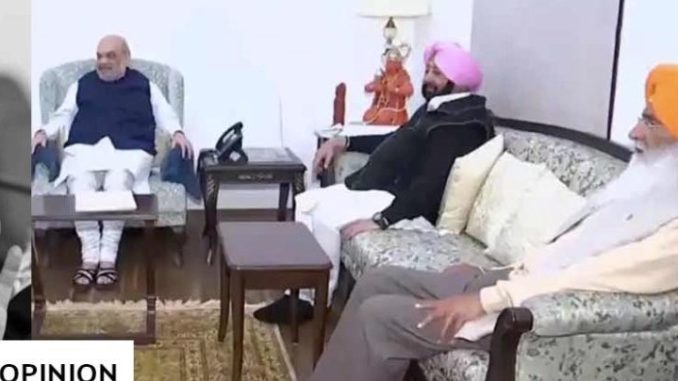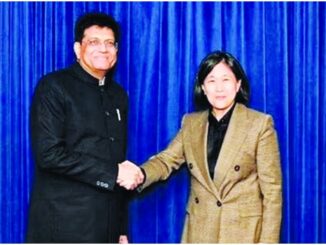

“Impossible is a word to be found only in the dictionary of fools,” is a famous quote of Napoleon Bonaparte who said that people should keep positive attitudes if they want to meet their goal or accomplish a task or effectuate some kind of change. He cautioned against getting side-tracked or to believe that anything was impossible.
This quote sums up Punjab’s political scenario. What one could not visualize three months ago was now turning out to be a reality. Everyone, except for the ruling Congress party, is working for a change. Sworn enemies are friends to fight the common enemy. They are going overboard to forge alliances and coalitions with the sole aim of accomplishing a task, grab the power. Never before Punjab had so many coalitions or alliances in the fray for political supremacy in the 117-member State Assembly. Traditionally, Punjab has been ruled by two parties – Congress, the oldest national party, and the Shiromani Akali Dal, the oldest regional party. It is not to undermine the role the coalitions have played in chartering the destiny of this border State. Though elections are still to be announced, new parties and new coalitions are hitting the horizon to send a strong message to the traditional players that battle of the ballot early next year is not going to be easy.
Punjab needs a change is the shout, loud and clear.
The oldest political alliance – Shiromani Akali Dal- Bharatiya Janata Party – has already become a part of history. Interestingly, three of the four major political players of the 2017 Assembly elections, will have new partners. The ruling Congress is an exception. It may go to the polls on its own.
Coalitions or alliances are an accepted political reality. Requisites for an alliance or coalition to make a political statement are a common minimum program and seat adjustment besides at times deciding the leader of the coalition.
Coalitions and defections also go hand in hand. While the BJP is scouting for Sikh faces, other parties have a tough challenge on hand to check defections. The BJP has been successful in getting at least three of sitting Congress MLAs, all Sikhs, in its fold and may get more in the coming days. Electoral alliances are looked upon as a part of the electoral strategy to draw maximum political advantage. That may be one reason that most political alliances or coalitions are announced on eve of the elections.
Coalitions and defections are closely linked. After reorganization on November 1, 1966, when the first popular Government assumed office in the State in March, 1967, it was a coalition government led by Justice Gurnam Singh with representatives of Jana Sangh (Dr Baldev Parkash) and an Independent (General R.S. Sparrow) in it.
It was the beginning and since then Punjab witnessed several coalition governments, mostly headed by Shiromani Akali Dal. Interestingly, at times, Akalis enjoyed clear majority in the Assembly, but still continued to keep the partnership with the BJP intact. Ultimately, this oldest coalition of the country ended after the BJP government went ahead with the controversial Farm laws. Though the government yielded to a year-long agitation of the farmers to rescind the laws, both the SAD and BJP, have gone ahead with new alliance partners for the coming elections. While the SAD has chosen Bahujan Samaj Party as its partner, the BJP has decided to go with the breakaway Congress group – Punjab Lok Congress – headed by the displaced Chief Minister Capt Amarinder Singh. This alliance has a third partner in the break group of Taksali Akalis – Sanyukat Shiromani Akali Dal) led by Sukhdev Singh Dhindsa. As of now, the SAD-BSP alliance has not only reached agreement on seat adjustment and common minimum program, but also chosen Sukhbir Singh Badal as its Chief Ministerial candidate. The BJP-Punjab Lok Congress-Sanyukat Akali Dal have constituted a panel to decide on seats and common minimum program.
The most talked about alliance between the Aam Aadmi Party (AAP) and the recently floated Samyukt Samaj Morcha is viewed as a formidable opponent not only to ruling Congress but also to the other two alliances.
The Samyukat Samaj Morcha, an umbrella political outfit of 20-odd Farmers Unions, is headed by the Bharatiya Kisan Union (Rajewal) President Balbir Singh Rajewal. A section of AAP had been projecting him as the probable Chief Ministerial candidate of the AAP-SSM alliance. The probability of this Alliance becoming real is diminishing by day.
Since one of the essential ingredients of an alliance is seat adjustment, SSM may feel handicapped as the AAP has already announced candidates for 88 of 117 seats, thus leaving little scope for the other partner to chip in its candidates on its winnable seats. Will this alliance become a reality is a question agitating many minds.
Congress appears to be going to the battle of the ballot on its own. With star campaigner and the President of the Pradesh Congress Committee Navjot Singh Sidhu going about his 13-point agenda of restructuring fiscal health of the State, it appears an uphill task as his differences with his own party government in the State continue to hawk media headlines.
Further, the party losing its MLAs to Bharatiya Janata Party, may be a cause of concern for the party high command. Three sitting MLAs – Rana Gurmit Singh Sodhi, Fateh Singh Bajwa and Balwinder Laddi – have already defected to the BJP. This is in addition to the displaced Chief Minister Capt Amarinder Singh who has floated his own party.
Differences apart, both Navjot Singh Sidhu and Congress Chief Minister Charanjit Singh Channi are running against the time as the promises made to electors of Punjab in 2017 are far from honored. Announcements made in recent months need a close follow up for implementation before the Model Code of Conduct comes into play.
(The author is the former Chief of Bureau of The Tribune. He can be reached at prabhjot416@gmail.com)





Be the first to comment